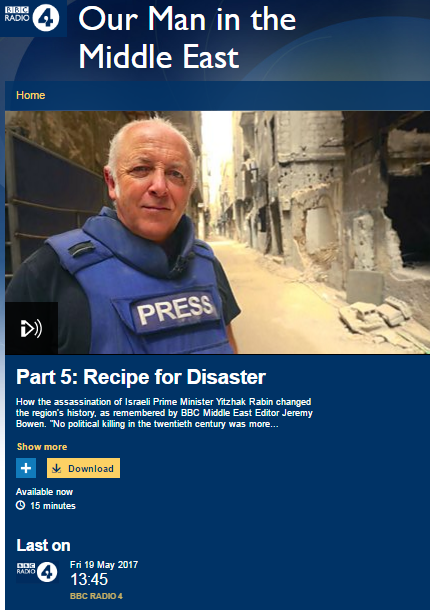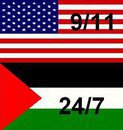Part five of Jeremy Bowen’s series ‘Our Man in the Middle East’ was broadcast on BBC Radio 4 on May 19th. Titled “Recipe for Disaster“, the programme’s subject matter is described as follows in the synopsis:
‘How the assassination of Israeli Prime Minister Yitzhak Rabin changed the region’s history, as remembered by BBC Middle East Editor Jeremy Bowen. “No political killing in the twentieth century was more successful,” he argues, observing the dramatic effects on the Oslo peace process. “Perhaps there was a moment for peace, and it came, and went.”‘
Like additional episodes in the series, this programme revisits a topic that Bowen has addressed before: in this case in November 2015 when he produced an article headlined with what is for him a rhetorical question – “Did Rabin assassination kill the best chance for peace?”. Nothing in Bowen’s approach has changed since then and his take away messaging once again leaves audiences in no doubt as to which side in the Arab-Israeli conflict killed off “hope” and “peace”.
Remarkably, Bowen’s 25 years in the Middle East have not done anything to improve his Hebrew pronunciation skills and listeners hear the former Israeli prime minister’s surname presented as ‘Ra-bean‘ throughout the programme.
The episode begins with Bowen’s personal recollections of reporting Rabin’s assassination on November 3rd 1995. From 03:58 he turns to the event itself.
“He [Rabin] was shot in the back by a Jewish extremist; a religious ideologue called Yigal Amir. […] Amir believed that Rabin was putting Jews in danger by turning land over to the Palestinians that he and the rest of the Israeli religious right believed had been given by God to the Jewish people. The prime minister had been getting a lot of flack from right-wingers in Israel, where being right-wing means opposing concessions to the Palestinians. He’d faced daily abuse, was accused of treachery and was even portrayed on posters in a Nazi uniform. Rabin’s supporters believed the leader of the opposition, Benjamin Netanyahu, was inciting and rabble-rousing against him.” [emphasis added]
Here is what Yitzhak Rabin’s daughter had to say on that topic two years ago:
“I don’t think Bibi sent Yigal Amir. And I don’t think Bibi thought that someone would murder the prime minister.
He understood one thing: that Yitzhak Rabin was standing in his way to becoming prime minister. But I don’t think it ever entered his mind that there could be a murder. This “pulsa denura” (death curse) comes from the darkest realms of religion – where Bibi has not been. I don’t think he ever connected to them. That is where it came from — from those rabbis that preached, preached openly, that Yitzhak Rabin had to be killed because he was going to bring upon us annihilation and disaster.”
Bowen’s remarkably trite portrayal of the Israeli political map does not include any explanation of the fact that the land to which he refers was designated by the League of Nations as part of the Jewish homeland or that it was subsequently occupied by invading Arab armies in 1948. Likewise, completely absent from Bowen’s recollections of the atmosphere prior to Rabin’s assassination is the surge in Palestinian terror attacks that took place after the Oslo Accords were signed in September 1993.
Referring to the Oslo II agreement, Bowen tells listeners that:
“People on both sides opposed what was happening. The peace rally in Tel Aviv [at which Rabin was assassinated] came as Israel was preparing to hand over the main cities and towns in the West Bank to Palestinian control. The prospect of giving occupied land to the Palestinians sent the Israeli Right into a fury.”
He then gives a highly debatable cameo of the atmosphere at the time:
“Some on the Israeli Left had worried the rally would be a flop. The Right had been making the most noise, shouting the rest of the country down.” [emphasis added]
Listeners are told that: [emphasis in italics in the original]
“If Rabin had lived the Oslo process might still have failed. It had serious flaws for both sides. Some Israelis, especially on the Right, argue that plenty of Palestinians would never accept a Jewish state. They didn’t trust Arafat and looked with loathing on Hamas and Islamic Jihad; two groups that wanted to destroy Israel – not make peace.”
BBC audiences are, as regular readers know, serially deprived of information which would enable them to understand that the Palestinians themselves make it quite clear to this day that they refuse to accept a Jewish state. Bowen again refrains from providing listeners with the essential context of the intense campaign of devastating terror attacks that Hamas and the Islamic Jihad were running against Israelis at the time and – as David Horowitz has documented – the effects those attacks were having on public support for the Oslo process.
“…the terrorism that had accompanied the efforts at peacemaking had eaten away at his [Rabin’s] popularity, and he was up against a potent political rival in Benjamin Netanyahu — so potent that mere months after the assassination, even as Israel reeled in horror at itself for the killing, the Likud leader was able to defeat Peres, the interim prime minister and natural heir. In the immediate aftermath of the assassination, Netanyahu was politically toxic, the leader of the camp from whose most radical fringe an assassin had sprung. But Netanyahu was carried to victory, by a nailbiting 29,457 votes, by those very same waves of terrorism — specifically four suicide bombings in February and March 1996 that persuaded a narrow majority of Israelis, however much they mourned for Rabin and for a country that could produce his killer, that the Oslo path, the Arafat path, was a bloody disaster.”
Bowen goes on:
“But many Palestinians accepted Israel’s existence while rejecting Oslo as a bad deal. They argued that Israel was deceiving them while it tightened its grip on the occupied territories, hugely expanding the number of Jewish settlers. Oslo was flawed but it was all they had and until Rabin was killed, it was working – just about. […] Without Rabin the Oslo peace process slowly collapsed. […] No political killing in the 20th century was more successful. Amir set out to kill the prime minister and the peace process.”
In fact, the building of new Israeli communities in Judea & Samaria had ceased with the signing of the Oslo Accords and people who went to live in the existing communities did so of their own accord; not because of any government policy. The Oslo Accords – willingly signed by the Palestinian leaders – of course do not place any limitations on construction in Israeli communities in Area C.
Bowen tells listeners that:
“The Oslo peace process staggered on for a few years mainly thanks to the energy of American negotiators.”
He fails to inform listeners that additional agreements were signed throughout the five years following Rabin’s assassination, including (paradoxically, as far as Bowen’s theory on the Israeli Right-wing and “opposing concessions to Palestinians” goes) the 1997 Hebron Protocol and the 1998 Wye River Memorandum under the government of Netanyahu.
Conveniently and crucially erasing from the picture Israel’s 2005 withdrawal from the Gaza Strip – including the evacuation of all communities there – and with only a token, tepid reference to the second Intifada, Bowen goes on to promote the ‘settlements destroy peace’ illusion and the usual partisan BBC presentation of ‘international law’.
“A generation on, Palestinians and Israelis have changed. Palestinians are disunited. Israelis are more Right-wing. Attempts to revive the peace process have failed. Trust and hope were sucked out by escalating Palestinian violence, the built-in violence of the Israeli occupation and the growth of Jewish settlements that are illegal under international law. It’s become commonplace to argue that the chance for a two-state solution has gone because Israel has settled so many of its Jewish citizens in the occupied territories. I think that if the will was there, with clever diplomacy it could still be done. But the will doesn’t exist. On both sides the most dynamic forces are inspired by religious certainty rather than the art of the deal. Religious Zionists drive the Jewish settlement movement forward. They believe that the West Bank and Jerusalem were a miraculous gift from God and cannot be given up. Palestinians do not have good political choices. They’re desperately in need of a political reboot. Fatah, the dominant faction in the PLO is moribund. Its Islamist rivals in Hamas are badly tarnished.”
Bowen’s subsequent and closing portrayal of the Camp David summit in 2000 is equally superficial and predictably he refrains from informing listeners that Arafat’s decision to launch the pre-planned second Intifada did no less damage to the ‘peace process’ than Rabin’s assassination.
“The problems were too big, distance between them too wide. Jerusalem and the land they both wanted could not, in the end, be bargained away. The summit in 2000 ended in a disastrous failure and ushered in years of violence in the second Intifada. Perhaps there was a moment for peace and it came and went.”
Bowen’s story ends there, with no mention of the Clinton peace plan, the 2005 Gaza withdrawal, the fact that Israelis elected Ehud Olmert – who ran on a platform of disengagement from Judea & Samaria – in 2006 or Olmert’s 2008 offer to the Palestinians.
Such inconvenient facts would of course detract from Bowen’s very transparent aim to steer BBC audiences towards the simplistic and inaccurate view that the Israeli Right-wing murdered the peace process, while propagating the illusion of passive Palestinians devoid of all agency or responsibility.
Related Articles:
BBC Radio 4 launches a new ME series by Jeremy Bowen
BBC’s ME Editor misrepresents the Hussein-McMahon correspondence
A predictable view of Jerusalem from the BBC’s ‘Man in the Middle East’
BBC ‘world view’ of Israeli-Palestinian negotiations laid out by Jeremy Bowen




